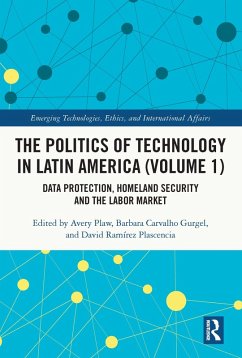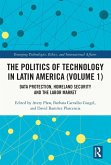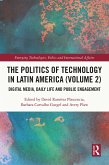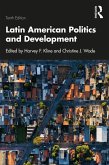This book analyses the arrival of emerging and traditional information and technology for public and economic use in Latin America. It focuses on the governmental, economic and security issues and the study of the complex relationship between citizens and government.
The book is divided into three parts:
. 'Digital data and privacy, prospects and barriers' centers on the debates among the right of privacy and the loss of intimacy in the Internet,
. 'Homeland security and human rights' focuses on how novel technologies such as drones and autonomous weapons systems reconfigure the strategies of police authorities and organized crime,
. 'Labor Markets, digital media and emerging technologies' emphasize the legal, economic and social perils and challenges caused by the increased presence of social media, blockchain-based applications, artificial intelligence and automation technologies in the Latin American economy.
This first volume in a two volume set will be important reading for scholars and students of governance in Latin American, the protection of human rights and the use of technology to combat crime and the new advances of digital economy in the region.
The book is divided into three parts:
. 'Digital data and privacy, prospects and barriers' centers on the debates among the right of privacy and the loss of intimacy in the Internet,
. 'Homeland security and human rights' focuses on how novel technologies such as drones and autonomous weapons systems reconfigure the strategies of police authorities and organized crime,
. 'Labor Markets, digital media and emerging technologies' emphasize the legal, economic and social perils and challenges caused by the increased presence of social media, blockchain-based applications, artificial intelligence and automation technologies in the Latin American economy.
This first volume in a two volume set will be important reading for scholars and students of governance in Latin American, the protection of human rights and the use of technology to combat crime and the new advances of digital economy in the region.
Dieser Download kann aus rechtlichen Gründen nur mit Rechnungsadresse in A, B, BG, CY, CZ, D, DK, EW, E, FIN, F, GR, HR, H, IRL, I, LT, L, LR, M, NL, PL, P, R, S, SLO, SK ausgeliefert werden.
"This volume demonstrates the bewildering social complexities associated with the adoption of internet technology in Latin America. This volume convincingly shows that technology is always intricately bound up with the social structures in and through which it operates. A unique engagement between technology studies and area studies.Latin America presents an unusual combination of obsolete and cutting-edge technology environments, which conspire to generate the fascinating paradoxes described in this outstanding volume." - Dr. Jochen Kleinschmidt, Universidad del Rosario, Colombia.
"Plaw, Carvalho and Ramírez Plascencia have assembled an exciting and diverse group of scholars to address important questions including: What are the effects of the increased use of the internet by people in Latin America? What are the challenges faced by privacy, data mining, and cyberbullying? What can be the best national responses and policies? How should we understand increased automation in industrial production? What is the effect of the use of drones in military campaigns, policing, drug trafficking, healthcare provision, and leisure? What are the effects of online information bubbles on social media on democratic outcomes? How is social media changing social movements and contentious politics? This volume forces us to think creatively and ethically about the challenges faced by technological change. It brings voices from Latin Americans based there as well as Latinamericanists based in the U.S. and Europe. Though, the relevance of the discussions and implications go beyond Latin America." - Ernesto Castañeda, PhD, Associate Professor, Department of Sociology, American University, DC; Co-author of "Social Movements 1768-2018."
"Plaw, Carvalho and Ramírez Plascencia have assembled an exciting and diverse group of scholars to address important questions including: What are the effects of the increased use of the internet by people in Latin America? What are the challenges faced by privacy, data mining, and cyberbullying? What can be the best national responses and policies? How should we understand increased automation in industrial production? What is the effect of the use of drones in military campaigns, policing, drug trafficking, healthcare provision, and leisure? What are the effects of online information bubbles on social media on democratic outcomes? How is social media changing social movements and contentious politics? This volume forces us to think creatively and ethically about the challenges faced by technological change. It brings voices from Latin Americans based there as well as Latinamericanists based in the U.S. and Europe. Though, the relevance of the discussions and implications go beyond Latin America." - Ernesto Castañeda, PhD, Associate Professor, Department of Sociology, American University, DC; Co-author of "Social Movements 1768-2018."









